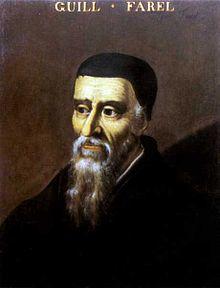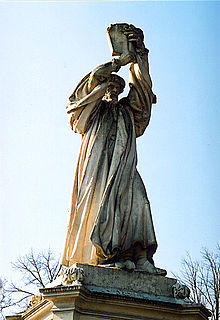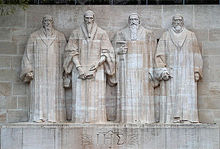William Farel | |
|---|---|
 Oil on wood, 16th Century in the Bibliothèque de Genève. | |
| Born | Guilhem Farel 1489 Gap, Kingdom of France |
| Died | 1565 (aged 75–76) |
| Occupation | Evangelist, theologian |
| Years active | 1522–1565 |
| Theological work | |
| Era | Reformation |
| Language | French, Swiss |
| Tradition or movement | Reformed, Calvinist |
William Farel (1489 – 13 September 1565), Guilhem Farel or Guillaume Farel (French: [gijom faʁɛl]), was a French evangelist, Protestant reformer and a founder of the Reformed Church in the Principality of Neuchâtel, in the Republic of Geneva, and in Switzerland in the Canton of Bern and the (then occupied by Bern) Canton of Vaud. He is most often remembered for having persuaded John Calvin to remain in Geneva in 1536,[1] and for persuading him to return there in 1541,[2] after their expulsion in 1538. They influenced the government of Geneva to the point that it became the "Protestant Rome", where Protestants took refuge and non-Protestants were driven out.[3] Together with Calvin, Farel worked to train missionary preachers who spread the Protestant cause to other countries, and especially to France.[4]
Life
Farel was born in 1489 in Gap.[5] He was a pupil of the pro-reform Catholic priesthood, at the University of Paris, in the earliest years of the Reformation. There he met the scholar Jacques Lefevre d'Etaples[6] who helped Farel obtain a professorship to teach grammar and philosophy at the Collège Cardinal Lemoine in Paris. With Lefevre he became a member of the Cercle de Meaux gathered together from 1519 by the reform-minded bishop of Meaux, Guillaume Briçonnet. Farel soon became regent of the college. By 1522 he was appointed a diocesan preacher by the Reformist bishop of Meaux, Guillaume Briçonnet. Farel now could invite a number of evangelical Humanists to work in his diocese to help implement his reform program within the Catholic Church.
This group of Humanists also included Josse van Clichtove, Martial Mazurier, Gérard Roussel, and François Vatable. The members of the Meaux circle were of different talents but they generally emphasized the study of the Bible and a return to the theology of the early Church. While working with Lefevre in Meaux, Farel came under the influence of Lutheran ideas and became an avid promoter of them. After condemnation by the Sorbonne, Farel evangelized fervently in the Dauphiné.
Farel was forced to flee to Switzerland because of controversy that was aroused by his writings against the use of images in Christian worship. He spent time at Zurich with Huldrych Zwingli and at Strasbourg, with Martin Bucer. He convinced Neuchâtel to join the Reform in 1530.[7]
Farel established himself in Geneva in 1532, where he remained as minister, drawing Calvin to the city, but breaking with him over the Eucharist. He, along with Calvin, was banished from Geneva in 1538, in part for his rigorous positions, and retired to Neuchâtel, where he spent the rest of his life. In 1558, when he was sixty-nine, Farel married Marie Thorel, who was a teenager. Scott Manetsch notes that Calvin was "flabbergasted and irate" at the marriage, "fearing that his friend's scandalous action would inflict irreparable damage on the cause of the Reformation throughout Europe."[8]
Although Farel was a friend of Calvin's,[9] he was a promoter of Lutheran ideas in his youth.[10]
References
- ^ González 1984, p. 65
- ^ Latourette & Winter 1975, p. 758
- ^ Latourette & Winter 1975, p. 751
- ^ Latourette & Winter 1975, p. 891
- ^ "Guillaume Farel". Encyclopædia Britannica. Retrieved January 14, 2016.
- ^ Latourette & Winter 1975, p. 750
- ^ González 1984, p. 68
- ^ Manetsch, Scott M. (2013). Calvin's Company of Pastors: Pastoral Care and the Emerging Reformed Church, 1536-1609. Oxford University Press. p. 102.
- ^ MacVicar 1955, p. 175
- ^ Marshall 2007
Sources
- González, Justo (1984), "John Calvin", The Story of Christianity, 2, Peabody: Prince Press, ISBN 978-1-56563-522-7
- Latourette, Kenneth; Winter, Ralph (1975), "The Rise of the Reformed and Presbyterian Churches", A History of Christianity, 2, Peabody: Prince Press, ISBN 978-1-56563-329-2
- MacVicar, Donald (June 1955), "William Farel, Reformer of the Swiss Romand, His Life, His Writings and His Theology", Church History, Cambridge University Press, 24 (2): 175, doi:10.1017/3161654, ISSN 0009-6407, JSTOR 3161653
- Marshall, Peter (2007), "Leaving the World", in Matheson, Peter (ed.), Reformation Christianity, Fortress Press, ISBN 978-0-8006-3415-5
- PAST, Fonds: Archives de la société des pasteurs et ministres neuchâtelois (13e-20e). Archives de l'État de Neuchâtel.
External links
- Works by William Farel at Post-Reformation Digital Library

